|
Today is the optional memorial of Sts. Cosmas and Damian, who were twin brothers born in the third century in Arabia. Both Cosmas and Damian became physicians, and in true Christian charity, refused to accept payment from their patients. During the persecutions under Roman Emperor Diocletian, the brothers’ renown in their Christian community made them easy targets. They were imprisoned and tortured by various means in an effort to force them to recant their faith, and after surviving most of these tortures while remaining true to Christ, Cosmas and Damian were finally beheaded.
What draws me to the story of Sts. Cosmas and Damian is not only their adherence to the faith while under excruciating torture, but also their unfailing generosity to those around them. They tended the sick in their community and did so without asking for or taking any monetary compensation. I like to think this was because they were often helping sick people who were also too poor to afford a physician in the first place. Generosity is a virtue that can easily be motivated by pride—we do good things for others, secretly hoping to get accolades or some kind of reward for being so self-giving. But I think generosity is really about giving to others —material, spiritual, or emotional—because you know the other will benefit, even if there is no compensation for you in return, or if (like Cosmas and Damian) you refuse to take any. Generosity is not only exemplified by a wealthy man donating money to charitable causes, nor only by going on mission trips to help those in poverty, nor is it demonstrated by showering poor children with gifts at Christmastide. We can cultivate the virtue of generosity in ourselves much closer to home and on a daily basis—just as St. Cosmas and St. Damian did. Generosity is lived out by a talented musician volunteering at his church to worship God in song, or by a mother who prepares and brings home-cooked meals to other families in her parish who have a new baby or have had a recent surgery. There is also spiritual and emotional generosity: being present and available to our siblings, children, parents, or friends as they struggle with transitions or discernment. When we engage in these acts of generosity, we serve Christ by serving others—even if it is not necessarily a sacrifice for us to do so. (Although I know for myself, the sacrifice that comes with being generous is striving to be selfless in my generosity and not to expect or desire reciprocation.) We are called to use anything that we have been given in order to glorify God. And what about those—presumably poor—people that Sts. Cosmas and Damian healed and treated? Who knows what kinds of generosity they were able to offer to their benefactors as a result of their encounter with the twin saints? Maybe they were generous in their prayer lives and interceded for the physician brothers. Maybe they were inspired by the generosity and faith of the two saints and went on to assist others in their community. Even if we cannot always be materially generous to each other, giving of ourselves in any capacity can cause a ripple effect of generosity throughout our communities. We can also learn to support and foster the generosity of others by thinking about how we respond when we are offered someone’s generosity, whether we asked for it or whether it was volunteered to us. Personally, I am working on asking for help or accepting generosity with humility. I know that I am less likely to help someone if they repeatedly protest my efforts or insist that I am doing too much, and therefore I try not to protest or downplay the good work that someone does for me. I try to remind myself that by serving each other, we are ultimately serving Christ. Questions for Reflection: Have you ever been the recipient of an act of generosity that changed your life? How so?
2 Comments
Today is the celebration of the Feast of St. Januarius, lovingly known in Italy as St. Gennaro. Januarius was an Italian bishop and martyr who died around the year 305. Not much is known about him other than what has been passed down in tradition, which tells us that the bishop of Benevento died under the Christian persecution of Diocletian along with six companions. After being thrown to wild beasts, who did not attack them, the Christians were beheaded. The accounts and lives of the martyrs always serve to build up the Church. As Tertullian’s saying famously states, "the blood of the martyrs is the seed of the Church." We recall the accounts of martyrs throughout the ages such as Felicity and Perpetua, Joan of Arc, Thomas More, Maximilian Kolbe, Blessed Miguel Pro, Blessed Richard Henkes, S.A.C., and most of the Apostles themselves. How diverse and rich is the witness of the martyrs and saints! In each generation, the martyrs demonstrate heroic faith in a culture of opposition that culminated in the sacrifice of their very lives. In the case of St. Januarius, his witness continues in a special way today as a result of his relics. Not only is his witness of martyrdom powerful, so is the miracle associated with his blood. After Janurius’ beheading, a woman named Eusebia collected the bishop’s blood in a vial. This was brought to Naples and has been venerated for centuries. Most extraordinarily, for the past recorded 400 years starting in 1389, the dried vial of Januarius’ blood liquefies typically on three dates a year: “in the spring during celebrations of the feast of the transfer of the saint’s relics to Naples; Sept. 19, his feast day; and Dec. 16, the local feast commemorating the averting of a threatened eruption of Mount Vesuvius through the intervention of the saint.” Most recently, his blood half-liquefied on a date outside of the normal dates with a visit from Pope Francis in March of 2015. In his typical humble fashion, Pope Francis responded to the applause from the crowd saying, “The bishop said the blood is half liquefied. It means the saint loves us halfway; we must all convert a bit more, so that he would love us more.” Through his words, Pope Francis reminds us that the purpose of miracles is to draw us closer to Christ and to increase our faith. Jesus performed miracles not for spectacle, but for healing and conversion. The miracles of holy men and women continue to this day and serve the same purpose: to inspire profound faith in the ongoing work of God that causes us to strengthen our love of Him in word, action, and service. May they inspire our own faith and lead us closer to the One who modelled perfect martyrdom in charity—Jesus Christ—whose martyrdom we commemorate at every celebration of the Eucharist. Nourished by his Body and Blood, may we emerge from our parishes strengthened to answer persecution with love, hatred with forgiveness, apathy with zeal, ignorance with truth, and selfishness with compassion. In doing so, we will be everyday martyrs—literally, witnesses—proclaiming the Gospel with our lives. St. Januarius, pray for us. How can we implement the Gospel? Although this is a difficult question, it is a very important one to answer. For us Christians, it is not enough to hear the Gospel. We are called to put it to action in our own life. Sometimes it is difficult to take action. How should one do it? The good news is that we are not alone in answering this question. We have examples of many who have asked it themselves and used their lives to answer it. Every time the Catholic Church declares a person blessed or a saint, she gives us an example of how the Gospel can be lived. Blesseds and saints are role models for our faith journey. Even if every one of us has to find out individually what God is calling us to and how to live the Gospel, the blesseds and saints can help us learn how to answer this call. How can the soon-beatified Pallottine Father Richard Henkes, S.A.C. be an example for our life and for our quest for God? When I read Fr. Henkes’ biography, I learned that he tried to live out the Gospel even when it seemed inconspicuous and less effective. Three situations in his life illustrate this. The first event took place when Father Henkes was a teacher at a Pallottine school. At this time, Nazi idealism had become stronger in Germany and ultimately reigned the country. Father Henkes saw the faith as a guide for young people who were confronted with the race theory that claimed the superiority of one people over others. Father Henkes knew that even small actions could have a big impact, for better or for worse. As a teacher, he gave the whole class a punishment for laughing at a child who used a Czech word; at this time, the Czech language and the Czech people in general were looked down upon. This might be a small incident, but Father Henkes saw it as his responsibility to intervene for the rights of the child and for the equality of human beings: he used his position as a teacher to go against inhumanity and injustice and brought the Gospel to life. Furthermore, Father Henkes used his work as a pastor to combat injustice. In his homilies, he spoke clearly against the Nazi ideology and their contemptuous acts, and he even got several warnings from the authorities about his preaching. In 1935, Father Henkes had confrontations with the Gestapo (secret state police) because he said in his sermon that the Nazi image of humanity was wrong. He knew that, if he continued, the government would prosecute and punish him. Though he may have been afraid, he did not stop because he was sure that he had to say and do whatever was possible against the Nazi regime. In his eyes, it was not right to stay indifferent to inhumanity, injustice, and murder, and to believe at the same time in God and God's infinite love for all people. Therefore, he continued to criticize the Nazis in his homilies, to speak publicly, and to encourage the people who agreed that the Nazis were wrong. Because of this, Father Henkes got arrested and deported to the concentration camp in Dachau. Finally, once in the concentration camp, Father Henkes also cared for the sick. When the war was almost over and the concentration camp was close to being freed, a typhoid epidemic broke out. Father Henkes volunteered to care for the infected people, most of them Czech. He did not have to. He was not forced to do it and he willingly experienced the inhumane conditions because he saw the care of the sick as his duty. It is clear that he lived the Gospel in the concentration camp: he brought a little bit of humanity and compassion into that hellish place. Father Richard Henkes is a role model for me because he was moved by God in such a way that the Gospel poured out into his daily life. He did not wait for a big opportunity to preach the Gospel; he did what he could in particular moments of his life. He did not stop hate after he punished the class in the school where he taught. He did not prevent or stop the war by preaching against the Nazis. He did not free those in the concentration camp by caring for the sick. But I really believe that he brought the Gospel and the Kingdom of God to people around him in every one of these incidents. He cut the circle of cruelty for the one pupil in the school, his parishioners, and the sick in the concentration camp. Not all of us are a teacher, priest, or nurse. But all of us are called to do what is needed in the situations we are given, according to our capabilities. In doing so, the Gospel will become reality. To learn more about the beatification of Father Richard Henkes, S.A.C. please click here. For Americans, the annual observance of the Fourth of July celebrates the independence of the United States. Our national story is made up of the varied lives and unique experiences of countless peoples who nonetheless share in seeking “life, liberty, and the pursuit of happiness.” Each of these people is following his or her own American Dream, the achievement of which requires hard work, fortitude, and faith. As we celebrate and reflect upon our personal freedoms— long fought for and subsequently defended— we also acknowledge those peoples whose rights are continually imperiled or at risk of being curtailed by injustice. The United States by no means has a spotless record in establishing civil rights, but those efforts have raised up incredible heroes who sought to make the American Dream more accessible peacefully and justly. As Catholics, we especially thank God for His blessings on this land and for the preservation of our rights to bear witness to Him publicly as Americans.
Thanks to the efforts of French and Spanish missionaries in the 16th and 17th centuries, Catholicism began to take root among the indigenous peoples of what would become the United States. As the fledgling country wouldn’t have an installed bishop until 1789, the American Church continued to grow during the first half of the 19th century thanks to the influx of Irish and German immigrants seeking the religious toleration which was becoming less and less abundant in Europe. Protestants were critical of these arrivals, declaring it was not possible to be a good American and Catholic at the same time (partly due to false beliefs spread about allegiance to the Roman pope). Thanks to the determination of these immigrants, and the grace of the Holy Spirit, by 1850 Roman Catholicism was the largest denomination in the United States. Despite the political and cultural persecution American Catholics experienced, the ministries and loving charity of certain clergy and religious ensured that the needs of their fellow citizens were met. Figures like Mother Cabrini and Mother Seton founded religious communities that took care of the poor whom society all too often ignored. Mothers Drexel and Duchesne cared for Native Americans (as did Kateri Tekakwitha), African Americans, and women as they evangelized with the missionary spirit. Fr. Michael McGivney began a member-benefit society (which would become the Knights of Columbus) to care for the widows and families of Catholic male breadwinners who lost their lives. Isolated from the public square, the Catholics of this country nevertheless found a niche caring for other outcasts through a public witness that expressed faith as the catalyst for action. Doing so forced many observers to cease their suspicions and prejudices and helped normalize Catholicism in America. The examples of faithful religious continued to inspire Catholics in all walks of life to live out their faith freely. In recognition of their faithful witness of the Gospel, many of these brave citizens are now hailed as saints for universal veneration in the Church. Today, secularism and the misrepresentation of civil rights threaten the very foundation of the society which Catholics have indisputably helped shape. Legal challenges are filed against religious symbols, schools, churches, and charities, supposedly for discriminatory actions or the preservation of the separation of church and state. American Catholics are often torn between publicly defending these institutions and their work or avoiding antagonization for speaking out. Nonetheless, the Church continues to meet the needs of the poor and the outcast in the same spirit of welcome the poet Emma Lazarus immortalized in the words of “The New Colossus,” which hangs in the pedestal of the Statue of Liberty: “Keep, ancient lands, your storied pomp!” cries she With silent lips. “Give me your tired, your poor, Your huddled masses yearning to breathe free, The wretched refuse of your teeming shore. Send these, the homeless, tempest-tost to me, I lift my lamp beside the golden door!” As Americans, we thank God for the gift of religious liberty and for those who continuously defend it. As Catholics, we pray for our leaders to be guided by the Holy Spirit to pursue justice and for those abroad who are still struggling for the basic rights and freedoms we enjoy. There is no shortage of opportunities around us to live and act as the saints before us. The American story continues with each of us; perhaps its future chapters will tell of the great love and commitment of countless citizens who welcomed the refugee, defended the unborn, cared for the disabled, accompanied the lonely and the imprisoned, fed the hungry, clothed the naked, promoted charity, and honored the dead. We have much to celebrate on July Fourth; may God always guide our nation in the ways of liberty and justice for all. There are several times throughout Scripture that I disagree with Jesus--today’s Gospel being one of them. Anytime I’ve experienced disappointment, injustice, or suffering, I have eloquently told Christ in exasperation, “this sucks,” or “I don’t like this,” or “my way is better.” I could use the same responses to Christ’s words today: “love your enemies…pray for those who persecute you…be perfect.” Are any of these things possible? In a word, no—if attempted alone. But God did not make man and then place impossible expectations on him. As Pope Benedict XVI is often attributed as saying, “you were not made for comfort, but for greatness.” And so, while Christ’s demands may seem unrealistic to every fiber within me, they guide me towards excellence—or, to use Jesus’ word, perfection. This perfection was the status of Adam and Eve prior to the Fall, and in an instance of particular grace, of the Blessed Virgin Mary. Baptism is the first step that allows us to grow in the perfection of the Father. Through it “we are freed from sin and reborn as sons of God; we become members of Christ, are incorporated into the Church and made sharers in her mission” (CCC1213) As sons and daughters of God, we are called to become like our Father. Baptism is the first step taken that enables us to be perfect as our heavenly Father is perfect. From there, we are called to cooperate with God’s grace in order to be transformed. It’s easy to think of our enemies as people bearing swords and armor, but my enemies do not have to be people who dislike me or who do not will my good. I can perceive a neighbor with jarring political views, or a family member with a pointed critique, or a gruff co-worker to be an enemy simply because they may injure my pride or annoy me. The complexity of human relationships and our own woundedness almost ensures that we may perceive enemies in any person—within our friends, family, church, community—at some point in our lives. And yet we are called to love those people and pray for them– especially the ones that may be closest to us. Jesus tells us that loving enemies involves not only doing acts of charity and extending forgiveness, but also praying. Intercessory prayer for our enemies is a form of charity. It means you are thinking about someone who has slighted you and lifting them up to God. It means blessing them in the midst of your hurt or wounded pride and willing their good in spite of it. It means you are engaging with your pain rather than avoiding or ignoring it—a humility which opens your heart to God’s grace and gives God room to work for his glory. It is for this reason that Jesus says to pray for those who persecute you. This relationship between prayer and charity is fundamental to the Christian life and guides us towards the perfection of the Father. Being a Christian should set you apart from the world. “If you love those who love you…what is unusual about that?” Jesus asks. The human way responds with “love your neighbor and hate your enemy.” That’s my first response, too. But the God who made man also knows what we are capable of and what he intended us for. And that is to be like him and share in his divine life. So, if God is love, we are called to be love. And this is made manifest in loving your enemies, praying for those who persecute you, and striving for Godlike perfection. As I’ve mentioned, it’s ok if this seems hard or even undesirable. I’m often reminded of the Scripture passage, “While the Spirit is willing, the flesh is often weak.” While Christ’s commands may sound honorable in theory, they are incredibly difficult in the heat of the moment or in the daily grind. But I believe the point Christ is reiterating in this passage is the need for radical charity—one which is given though not deserved. It was this charity that enabled Christ to look into the eyes of those who tortured and crucified him and say, “Father, forgive them, they know not what they do.” This—this is what separates the Christian from the rest of the world. And it is not reserved for Christ or Mary or for humanity before the Fall—it is possible for each and every one of us if we but open ourselves to God’s grace. The saints learned this well. I remember reading, for example, in the Diary of Faustina about an unjust instance with a priest who interrupted her confession and told her to come back that evening, only to ignore her and send her home that night. Immediately, Faustina praised God, prayed, and offered up sacrifices for this priest. Without a moment’s hesitation, she loved her enemies, prayed for those who persecuted her, and therefore imitated the perfect charity of the Father. As we continue to follow Christ, may we ask for the strength to follow in the footsteps of the saints in order to be perfect as our heavenly Father is perfect. Questions for Reflection: Do you find Christ’s words in today’s Gospel difficult? What’s one step you can take today towards loving your enemies? As a nation, we celebrate Martin Luther King, Jr. Day on January 21st. Does this mean anything special for the Church—for Catholics, even? Catholics have much to learn and celebrate about the Baptist pastor, preacher, and prophet. The more we consider how far we have come as a nation and as a human race since Dr. King met his tragic end on April 4, 1968, the more we sense, I think, just how far we have to go to realize his Dream. When I think of Dr. King, I think of justice. Biblical justice. To recall a famous quote (King’s paraphrase from Theodore Parker), “The arc of the moral universe is long, but it bends toward justice.” As our nation honors Dr. King in a few days, I think it might be wise to contemplate for a moment the role of justice in our discipleship, which is an integral aspect of our baptismal identity as priest, prophet, and king. As a pastor and preacher, Martin Luther King, Jr. understood deep in his bones the kerygmatic nature (from “kerygma”) of true justice. Justice is a gift of Jesus. Like all gifts and graces from God, it is meant to be multiplied and shared. Even in the most difficult times of persecution, Dr. King proclaimed the gift of justice. In his famous “Letter From Birmingham Jail,” Dr. King wrote the words, “Injustice anywhere is a threat to justice everywhere.” Dr. King (who earned a Ph.D. in Philosophy from Boston University) quotes St. Thomas Aquinas in defining an unjust law as “a human law that is not rooted in eternal and natural law,” and then adds a simple explanation: “Any law that uplifts human personality is just. Any law that degrades human personality is unjust.” St. Thomas Aquinas (1225-1774), the great theologian of the Middle Ages and among the greatest in the history of the Church, defined justice as giving the other what is their due. Thomas Aquinas even defines “religion,” which is a virtue, as a form of justice, because it gives God the worship and adoration that is owed to him. First, can we ask ourselves where justice is still lacking in our world and in our own Church insofar as it is, alongside its spiritual identity, an institution composed of fallible, sinful human beings? Any lack of justice is a sure sign that we, the Church, have become adept in talking about the Gospel but have yet to take living it just as seriously. In her ongoing task of renewal, the Church must recover a robustly biblical, prophetic vision and conviction that justice is not accessory to the Gospel. Fortunately, in my own observations and ministry, I have seen that many young Christians are mending the gap that seems to have developed between “social justice Christians” and “liturgy and doctrine Christians.” This distinction is foreign to Aquinas and King, and the extent to which we buy into this split is the sign that we have allowed our faith to be compromised by the politics of the day. To offer one way of restoring this divide, in his letter Dr. King writes, “We are caught in an inescapable network of mutuality, tied in a single garment of destiny.” What if we thought about our baptismal garment, symbolic of putting on the life of Christ, as also the Church’s “garment of destiny”? Salvation and justice are the garment that clothes the body of Christ, the Church. One way of looking at Dr. King’s quote about the moral arc is to see it as a challenge that is not “way out there” in the universe, but as an invitation to bend and mend our personal lives toward justice. What might it imply to bend our lives? A change of habit or lifestyle, resisting our initial unkind or selfish response or natural inclination, and going out of our way to change the trajectory of our relationship with other people, our nation, and even creation. This is the message of “integral ecology” Pope Francis teaches in his encyclical letter Laudato Si. Dr. King saw God’s providential hand at work on a cosmic level, and as Catholics, we recognize the need as disciples to participate in God’s grace, and that includes justice. Authentic justice takes work, effort, struggle, and at times—as many true prophets in Scripture and history have experienced—persecution. Not all of us are called to create justice in the same way, yet we are all called to create justice in some way. Question for Reflection: What is one concrete step you can take to help create a more just situation in your family, school, workplace, or other sphere of influence today? To learn more about Catholic Social Teaching, please click here. 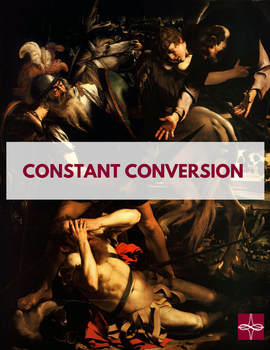 The story of St. Paul has always been one that has touched me to my very core. To think that someone who was persecuting the Church—who saw to it that the very first martyr, Stephen, was stoned to death—would eventually leave everything to follow God’s will for his life is truly extraordinary. But the story of St. Paul, although extraordinary, is not something beyond our reach. Some of us have experienced massive conversions in our lives—whether they involve entering the Church for the first time or returning to the sacraments after a time away. Some of us have had conversions of mind and heart when it comes to embracing what the Church teaches in regards to morality. Still others experience ongoing, undramatic conversion throughout their lives. Regardless of our individual experiences, the conversion of St. Paul can inspire us to encounter Christ in a deeper way that leaves us transformed. The Church does not celebrate the feast of the conversion of St. Paul merely for that moment of initial encounter and conversion. We celebrate it because of how it changed absolutely everything for Saul, now Paul. Paul met Christ personally; and this encounter guided his decisions and actions for the rest of his life. And so it must be with us! Shortly after Paul’s conversion on the road to Damascus, Acts 9:18 describes how after a conversation with Ananias, “things like scales fell from his eyes.” It was only after this that Paul was able to go and preach the good news of the Gospel—the good news that changed everything for him. Although we may not be knocked blind by a voice in the heavens, most of us do have scales on our eyes that prevent us from truly seeing and knowing Christ and spreading the Gospel. Whether we experience scales of sin, shame, bitterness, or inadequacy, we must remember that God desires constant conversion for us. Just as He so faithfully spoke to Paul in his conversion, He is inviting us to the same thing—the promise that a life turned toward Him will be better than anything our clouded eyes could imagine. This will manifest itself in our lives in any number of ways—through reconciliation in a relationship, returning to confession, or an increased disposition of mercy for those in our lives who need it. By allowing our lives to be constantly converted, we will be equipped, encouraged, and enabled to share the news that changed everything for Paul 2000 years ago and that continues to change everything for us now. Let us pray and ask the Lord for a deeper encounter with him. May he continually remove the scales from our eyes. St. Paul, pray for us! Questions for Reflection: Have you experienced a powerful moment of conversion or has your spiritual life been one of ongoing, gradual conversion? What might be some “scales” in your life that prevent you from living as a missionary disciple? Peter and Paul are often depicted together in iconography in a circle, embracing one another in a brotherly hug with expressions of affection. In contrast, images of Romulus and Remus, the mythological twins, are usually facing away from each other. According to legend, Romulus and Remus, after whom the city of Rome was named, were abandoned at birth and cast into the Tiber River. When they grew up, the twins embarked on a quest to found their own city. Romulus and Remus disagreed about which hill to build their city on. Eventually, Romulus just started digging a ditch around the Palatine Hill and building a wall. Remus mocked his brother’s work, and in a fit of anger Romulus killed him; Rome and her empire were founded on fratricide. Now contrast this with the re-founding of Rome through the spread of Christianity by Sts. Peter and Paul. If anyone had a cause for strife and division, it was these two. Paul was the chief persecutor of the early Christians led by Peter. These two, at first, had little in common. It took divine action to make these enemies into brothers. Peter and Paul were ultimately bound together in a bond stronger than blood: the love of Christ. It is in this love that Peter and Paul had the foundation of their relationship. Through Christ, these two men were closer than twins in the womb. That’s something I don’t think we fully understand today. Media often portrays the family as the highest and most deserving of our love and loyalty, but there is One who has a higher claim on us. Jesus says, “Whoever loves father or mother more than me is not worthy of me, and whoever loves son or daughter more than me is not worthy of me; and whoever does not take up his cross and follow after me is not worthy of me.”[1] God must come first in our lives, as he did for Peter and Paul. All of our relationships need to take their cue from this one. It isn’t that these natural, human relationships are bad; quite the contrary, they are good. But they are called to be ordered and rooted in the love of Christ. For Peter and Paul, Jesus of Nazareth was the source of their relationship. Peter knew Jesus and walked with him for three years before Christ entrusted him with his flock. Paul, formerly Saul of Tarsus, persecuted Christ by persecuting his followers until Jesus appeared to him on the way to Damascus. Peter and Paul eventually met and talked about the workings of God in their lives and in their ministry. That doesn’t mean they always got along perfectly. In what is known as the “Incident in Antioch,” Paul calls Peter out on the issue of whether or not Gentile converts have to first become Jews and follow Jewish laws in order to be “real” Christians. Peter had previously stated that the Gentiles had no need to follow Jewish custom, and that the new covenant was open to all. However, under pressure from Jerusalem, Peter went back on his word. He traveled to Antioch, where Paul was, and Paul “opposed him to his face because he clearly was wrong.” One can almost hear the exasperation in Paul’s voice as he writes of the incident. But along with the exasperation, one can hear love. Paul is not calling Peter out for the sake of pointing out his spiritual brother’s mistake, but for the sake of the Church and Christ, whom they both love and preach. Peter accepted Paul’s rebuke. In fact, it gave Peter courage to stand up to the Judaizers, those who wanted the Gentiles to practice Jewish customs. Paul always accepted and sought out Peter’s authority as head of the Church, but it didn’t stop him from encouraging his brother to remember the truth and to care for the souls entrusted to him. Peter and Paul remind us that brothers can be born from unlikely sources. Early Christian tradition tells us they were imprisoned together for nine months before their martyrdoms on the same day. The New Rome and her Kingdom were founded on fraternal love. As we celebrate the Feast of Saints Peter and Paul, let us look to their model of fraternal correction and mutual love as we work to spread the Gospel message in our own lives. Questions for Reflection: Have you ever had to challenge a friend or family member to become a better version of themselves? Has anyone ever called you out on something you were doing that wasn’t in line with your faith?
There’s a fear that’s crippling our call to discipleship today: The fear of failure. Let me just say, this is hard as Americans. We love success. We’re taught from a young age to dream it, pursue it, seize it. We value success stories; we want to have a greater impact, to change the world, to maximize results. If we can achieve this in our faith and ministry, even better, right? Well, maybe. This might be the message written into the American narrative, but it’s not necessarily the Gospel. Our assumptions start sounding odd alongside the Beatitudes Jesus gave his followers, and his promise to the disciples foretelling persecution and rejection (Mt 10:16-23). Moreover, St. Paul claimed to be “content with weaknesses, insults, hardships, persecutions, and constraints, for the sake of Christ” (2 Cor 12:10), and even instructed the Thessalonians, “to aspire to live a tranquil life, to mind your own affairs, and to work with your own hands” (1 Thess 4:11). St. Paul’s suggestions are not exactly the keynote themes we have come to expect at most high-energy church conferences these days. Not surprisingly, we are simultaneously inclined to relish the failure of others. As much as we love the success of a celebrity, we equally revel when the mighty fall. When this happens to church leaders, we assume they are fakes, phonies, or just not very gifted. What doesn’t easily capture our imagination is the struggle that happens in between — the daily living and dying to self that occupies the majority of time and energy in pastoral ministry. Resolving petty conflicts, preparing talks for kids who probably don’t care, assisting the odd homeless woman who keeps knocking at the door — if only we could eliminate these distractions and move on to the real work of the Gospel! Meanwhile, we eat up sensationalized stories of success and failure in an escape from what is real, and ultimately, redemptive. Success and failure actually have less to do with the size or location of a church than what values and expectations shape the content of our discipleship. When we inadvertently conflate American pragmatic principles for Gospel virtues, we risk making disciples who measure their faithfulness by a standard of fruitfulness foreign to the Gospel, thus creating a ministry model unhealthy for our souls and our churches. Failure is not fun or romantic. It’s not something to rejoice, or even proof of our faithfulness. But it prepares the ground for fruitfulness. Fruitful soil is rich with dead and decaying stuff — our failures — that ultimately make us ready to plant the seed of the Kingdom of God. Recovering a “theology of failure,” as Pope Francis and others have spoken of, may be an important step for renewing our Catholic imaginations and acquiring the heart of Jesus. In order to “ready this soil” there are a couple of things we can do to change the way we think about and approach our daily ministries. Ministry is a Process, not a Product When we measure a ministry’s effectiveness, we often desire quantifiable results steadily increasing along a straight line on a graph. There’s definitely a place for this kind of analysis in running a church or ministry. But doing God’s work often follows a slow progression passing through unanticipated hills and valleys. We look at a person’s life and say, “Here’s where Jenny lost her job and had to cut back time and money at church, but here’s where her small group members provided babysitting and cooked meals.” The Church and her members rise and fall by the logic of the death and resurrection of Jesus, not by the laws of the stock market. Seek Balance, not Efficiency When we elevate efficiency above balance, disciple making resembles an assembly line that aims to produce predictable outcomes in the shortest amount of time. One corrective measure we can take is to remember to keep holy the Sabbath. Is our ministry bringing us peace of soul, or are we burned out and burdened with too much stuff at church? It’s possible we need to pursue more effective systems or strategies, but maybe what we really need is to recover rest in God’s redeeming love. Share Stories of Redemption In the gospels, the opposite of failure isn’t success, but redemption. Pay more attention to stories of redemption than stories of outward success. I love the story of Blessed Charles de Foucauld, a 20th century monk and martyr who lived amongst the Tuareg people of the Sahara Desert, sharing in their daily joys and struggles while representing the love of Jesus. His story and spirituality inspired others, but only years after his death (see his Prayer of Abandonment). As part of our task for the New Evangelization, I suggest we revisit what we call success and failure and begin pursuing ends not so focused on winning in a religious market, but embodying the example set by our savior, Jesus Christ. In some way, I think we come closest to understanding our ministry in light of Christ’s death and resurrection, i.e., when we are in the valleys our world labels “failure.” In these valleys, we throw ourselves upon the power of the Resurrection, knowing we cannot rise again on our own. Have you ever been called frail before? I was once by a priest in a homily; the word was unsettling. As the priest slowly enunciated the words, “You. Are. Frail” a flood of various thoughts rushed over me. Mainly, I was proudly scoffing and thinking, “I’ve got this. I have my spiritual life together. I mean, I am one of the few Catholics that goes to Mass every Sunday…That says something, right?”
Frailty. The word itself seems weak, puny. In reality, those thoughts of mine, the “Oh I got this” or the “I’m not doing so bad”—don’t they reveal my frailty, my weakness? They reflect a mindset rooted in pride that doesn’t think that I need Him. Perhaps more unsettling are Paul’s words to the Corinthians. Paul writes about begging God to remove a thorn in his flesh, to which God replies, “My power is made perfect in weakness.” Paul continues in his Letter, “I will all the more gladly boast of my weakness, that the power of Christ may rest upon me. For the sake of Christ, then, I am content with weaknesses, insults, hardships, persecutions and calamities; for when I am weak, then I am strong!” Doesn’t the world tell us that we need to have our act together—the complete opposite of Paul’s words above? Why would we boast in the things we are not good at? The saints are saints because they know they are weak sinners, and yet they never became complacent. They boasted in their weakness while asking God for the grace and love to grow in the midst of it and didn’t attempt things on their own. They were receptive to the Lord’s guidance, His divinity. Our Holy Father, Pope Francis, also exhibited this “boasting” at the beginning of his papacy when he said, “I am a sinner…but I trust in the infinite mercy and patience of our Lord Jesus Christ.” In Scripture, we are compared very often to sheep. Sheep need the shepherd to survive. They have been known to graze on the same grassy area, gnaw the grass to its root, which kills the grass, and eventually starve themselves to death due to the lack of nutrition. The shepherd must therefore guide the sheep for survival. Jesus, the Good Shepherd, guides us. Will we let him or will be remain complacent? The real problem that I encountered in the pew that Sunday was this complacency. Like the sheep, I was gnawing at the same grassy area, stubbornly thinking I was getting the nutrients and food I needed. I, like Pope Francis, must recognize that I am a sinner—that I am frail and I need Him. Only this will allow me to boast in my weakness. When I acknowledge that I am weak, I am acknowledging my need for Him evermore. When I acknowledge my dependence on Him, He then can give me the strength I need to make it through the day—to accept His Love in my human limitations. If we are to journey on the beautifully romantic and stretching road to holiness, we must be careful of feeling too comfortable while gnawing the same patch of grass. Instead, we are called to boast in our weakness and invite the Lord to move in us, to change us. Change and growth are uncomfortable, but necessary to the Christian life. For we are frail, and yet we boast in the sheepishness—knowing our Shepherd is strengthening and guiding us along the path. The quickest and surest way to be led by the Good Shepherd is by letting Him consume us in the Holy Eucharist. There, we are united with our Shepherd, held in His gentle and loving arms close to His Sacred Heart through the good and the bad. There, we will find true comfort, there we will be able to join St. Paul and see our frailty turned into true strength! Elizabeth Pawelek is pursuing her Master's in Leadership for the New Evangelization at the Augustine Institute in Denver, Colorado. “Christus resurrexit! Resurrexit vere!” “Christ is risen! Truly, He is risen!” This most wonderful news remains at the core of the dogma and Gospel message of Christianity; yet when it was first proclaimed by Mary Magdalene to the apostles, they thought it was utter nonsense. Even nearly two thousand years of evangelization later, there remain those who have doubts, as the apostle Thomas did, about the Resurrection, demanding hard, irrefutable proof that they might begin to believe. Some reject the Church completely, perceiving it as clinging to outdated moral and socioeconomic beliefs. The persecution of the Church in various forms and intensities continues to this day, with some parts of the world undergoing similar brutality suffered by the earliest Christians. Critics continuously point to and decry the scandals and the perceived subsequent reformation failures harming the Church, referencing various statistics on vocation shortages to the priesthood, the instability of parishes, and any and all catechetical dissent from within. In a world where evil appears to be flourishing and truth is increasingly being perceived as relative, the faithful and nonbelievers alike find themselves wondering: how does the Church continue to endure?
“I believe in Jesus Christ” the Creed declares. Our faith is in God— not the clergy, the laity, nor any others who are susceptible to sin. Christ is and remains the “head of the body, the Church… through whom he extends his reign over all things” (CCC 792). Just as Christ chose imperfect men to be His apostles, He commissions us all to “go and make disciples of all nations... teaching them to obey everything I have commanded you” (Matthew 28:19-20). In doing so, we do not call attention to ourselves but to Christ, whose perfection we strive to imitate in our daily lives. As members of the Body of Christ, we are obligated to hold accountable and care for each other as we strive to remain holy (see 1 Corinthians 12:21-31). When one of us falls along the way, we cannot abandon that person— Christ always remains faithful (see 2 Timothy 2:13)! Everyone has shortcomings, yet our Lord never shied away from them because they weren’t perfect. His perfect love sanctifies the Church and gives her life! This same love should drive us to pick ourselves up, seek forgiveness, and continue to complete our mission of evangelization no matter the challenges facing us. As we can see in today’s culture, one of the biggest challenges facing the Church is the problem of moral relativism. Like his predecessors, Pope Francis warned how this way of thinking contributed to the “material and spiritual poverties of our time”: But there is no peace without truth! There cannot be true peace if everyone is his own criterion, if everyone can always claim exclusively his own rights, without at the same time caring for the good of others, of everyone, on the basis of the nature that unites every human being on this earth. The slippery slope of moral relativism threatens the stability of society and the integrity of the human person. The Church, to her credit, is set apart from the rest of the world in her pursuit of Truth. The world, like Pilate, retorts, “What is truth?” (John 18:38) to which the Church responds, “[God’s] word is truth” (John 17:17). I take great comfort in the Church’s strong convictions, particularly regarding human dignity, social justice, and the sanctity of life, marriage, and the family— she does not back down because the truth is unpopular or uncomfortable. In spite of persecution, the Church has always and will continue to remain steadfast in calling the world back to God. As the song goes: Lord, you give the great commission: “Heal the sick and preach the word.” Lest the Church neglect its mission and the Gospel go unheard, help us witness to your purpose with renewed integrity; with the Spirit's gifts empower us for the work of ministry. Though evil seems to overshadow the good in the news, evil never has the final word. God can bring good out of evil; after all, Easter Sunday followed Good Friday. We, as Christ’s Body on earth, cannot sit back and wait for it to happen by itself; rather, it is up to us to pray for guidance and grace to aid us in overcoming the challenges that face us in the mission God has specially tasked us to complete. In the words of St. Josemaría Escrivá, “He did not say you would not be troubled, you would not be tempted, you would not be distressed, but he did say you would not be overcome” (see John 16:33, Matthew 16:18, cf. John 15:18-25). We may pray for an increase in faith, that is, “to touch Jesus and to draw from him the grace which saves,” but even the littlest faith is sufficient to do God’s will (see Matthew 17:20-21, Luke 17:5-6)! May the doubting apostle St. Thomas intercede for us as we continue our noble work! Thomas Wong is an undergraduate at The Catholic University of America in Washington, D.C. They bought into the lie—that nothing had changed, that their dreams were stifled, that death prevailed. The locked doors reflected their locked hearts. Like anyone, they were afraid, inconsolable, at the point of despair. Save one—a virgin. She continues to model to us today what it means to live faith, what it looks like to be a disciple.
The fear of the disciples in the upper room is understandable. They had abandoned the man whom they had left everything to follow for three years. The same man they had pledged to follow unto death had been tortured and killed as their backs were turned, as they cowered for their own lives. Their hopes of a restored Jewish kingdom, a glorious king from the line of David, freedom from Roman rule and the return of God’s presence to the Temple seemed to be nailed to a cross on Golgotha, laid in a tomb hewn from rock. They had yet to see God’s plan amidst the perceived failure. How could this be God’s plan? It was so unlike their own. Their fear is our own. It is the fear of unmet desires, of unworthiness, of death, of uncertainty, of perceived silence. Like the disciples, we often fail to see God’s plan in our lives. We look around in despair and sense that He is silent. We live the reality of death, confusion and suffering and say, “nothing good can come from this.” But as the disciples quickly realized, our ways are not God’s ways. Our wills are not yet one. Much stands in the way: selfishness, greed, egoism, materialism, pride. All changes with the coming of the Holy Spirit. What makes a law-abiding Jew abandon his persecution of Christians in favor of joining them and proclaiming the Christ to Jerusalem and Rome? What makes uneducated fisherman leaders of the universal Church and martyrs for the faith? What makes the son of a wealthy Italian merchant the begging founder of a religious order and a friend of the poor? What makes a cloistered nun in Lisieux a Doctor of the Church? What makes a German priest in Auschwitz volunteer to die in place of a father? What makes a modern day Italian mother and doctor offer her life for that of her child? The Advocate, the Holy Spirit. It is the Holy Spirit who is the game changer for the Church—what will now set the disciples apart from the whole world and what continues to set Christians apart today. The Holy Spirit is the active agent of conversion in man, the third person of the Trinity who opens up the Scriptures and sets our hearts on fire. It is the Holy Spirit who enables us to live our mission. The Holy Spirit, God’s love, is the difference between the fearful men in the upper room and the on-fire disciples of Christ preaching the Gospel and converting thousands in a single day. In the Gospel today, Jesus prays for his followers in the Garden of Gethsemane while also speaking directly to you and me. He prays for something seemingly impossible: “that they may all be one” as the Trinity is one. Christ speaks these words not to frustrate his followers but to call them to a perfection possible through God alone. He utters these precious words knowing he will be sending the Holy Spirit to enable man to do this. The goal is outward. This communion—the call to unity—must lead to mission: “that the world may know that you sent me and that you loved them.” God’s love is efficacious. It cannot be contained but must be proclaimed to the world. Only God could deign to give man so dignified and impossible a call. And only God could enable man to fulfill it. This high priestly prayer of Jesus (which encompasses John 15-17) is one of my favorite parts of Scripture. It is so imbued with Christ’s love for us. The purpose of the Incarnation is about to be revealed. Christ is living his last moments and wants to remind his followers, you and me, why he came: to reveal the Father, to invite man to eternity with Him and to assure man of his lovable-ness in the eyes of God. This love of God is meant to abide in us and reach out from our hearts to the hearts of others. This is only possible through the Eucharist, which physically is Christ’s love present in us and which is made possible through the Holy Spirit. God himself calls us, but God himself equips us…with Himself. It is astounding to what we are called: to holiness, divine love. This is the Christian destiny, but not our inclination. Like the disciples, so quickly do we turn inward. So quickly do we lock the door in fear. God calls us to sanctity, which can only be achieved after an experience of the fire of God’s love. We call this Pentecost, the same outpouring of the Holy Spirit that we receive in Baptism and Confirmation. The same outpouring of the Holy Spirit that we receive every Sunday in the form of the Eucharist. Are we being transformed by this grace or do we remain in the upper room? I challenge you to go back to your own story, your own moments of conversion. When did you fall in love with God? Have you? Only armed with the certainty of being loved will we be able to love others and live out the communion and mission Jesus calls us to. And so we call upon the Holy Spirit, the love of God Himself, who was breathed out upon the disciples at Pentecost in tongues of fire. We ask the Holy Spirit to breathe new life within us, within the Church. We ask the Holy Spirit to transform us with the fire of God’s love. This results in unlocked doors, an empty room. The disciples emerged, transfigured. Will you? Kate Flannery is pursuing a Master's degree in Leadership for the New Evangelization at the Augustine Institute in Denver and graduates in May. If someone were drowning, whether you knew how to swim or not, would you save them?
This is one of the sayings that Irena Sendlerowa’s father told her to remember and use as a model for her life. As a young Catholic social worker living in Nazi-occupied Poland during World War II, “Irena Sendler” made this question her life’s testament by saving Jewish children and orphans from the Warsaw Ghetto. January 27 is designated by the U.N. as International Holocaust Remembrance Day. This day of remembrance is appropriate for National Sanctity of Life Month. We may first think of respecting life in terms of the unborn, but being pro-life means honoring life in all stages. The horror of the Holocaust violated a respect for life. Many Catholics during this period of time understood the threat anti-Semitism brought to humanity. It’s not surprising many Catholics aided in protecting Jews and other targets of the Nazi Party. Irena Sendler was not a commonly known hero of the Holocaust until nearly a decade ago when four high school girls from rural Kansas created a 1999 National History Day (History Fair) performance focusing on the heroine. “We saw a 1994 U.S. News & World Report that was five years old [at the time we read it] with a clipping entitled, ‘Other Schindlers,’ and Irena Sendler was listed as saving at least 2,500 children,” said Megan Stewart-Felt, one of the four students who created Life in a Jar: The Irena Sendler Project. “ ‘Irena Sendler’ received one hit on Google in 1999,” said Felt. “Today I type in her name and have more than 767,000 hits.” Sendler’s work in saving Jews didn’t start with her efforts in saving children in the Warsaw Ghetto. As a young university student, Sendler made false documents for Jewish friends and others in the Warsaw area from 1939 to 1942 before she joined the underground Zegota, a Polish underground group to assist Jews. “Life in a Jar” describes perfectly the actions Sendler used to save Jewish children in the Warsaw Ghetto. Sendler, along with 10 others under her direction, implemented various tactics of getting children past Nazi guards. Several of these tactics included Sendler posing as a nurse taking “sick” or “dead” children out of the ghetto, smuggling a five-month-old baby in a carpenter’s box and using a barking dog to conceal the crying children, hindering Nazi guards from thoroughly examining the cargo vehicle. Sendler then adopted the children into homes of Polish families or hid them in Catholic convents, orphanages, and parish rectories. Priests and monks provided some Jewish children and adults with false baptismal certificates to pose as Catholics. AmericanCatholic.org quotes Szymon Datner, a Jewish historian, as saying about Catholic nuns, “No other sector was so ready to help those persecuted by the Germans. This attitude, unanimous and general, deserves recognition and respect.” To ensure the children would one day discover their true identity, Sendler made lists of the children’s real names and family information and concealed them in jars she buried in her garden. Nazi’s did capture Sendler. She was beaten severely and even scheduled for execution, but the Polish underground bribed a guard to release her and she entered into hiding. Sendler passed away at the age of 98 on May 12, 2008. Just one year before, Sendler was nominated for the Nobel Peace Prize in Oslo, Norway for her courage and valor in saving Jewish children. Additionally, Yad Vashem recognized Sendler in 1965 as Righteous Among the Nations. During National Sanctity of Life Month and International Holocaust Remembrance Day, it’s important to reflect and gain inspiration from everyday heroes, such as Irena Sendler, whose actions saved many lives, often at great risk to their own. Dana Edwards is a recent graduate of the University of Florida. She currently resides in Tallahassee, Florida where she works as a Digital Strategist, and volunteers as a lector and with communication outreach at her local parish, Good Shepherd Catholic Church. Today we celebrate the Solemnity of the Blessed Virgin Mary, Mother of God. As I thought about the many lessons we can learn from our Blessed Mother, I found myself particularly drawn to wondering what it means to be a woman of faith. I’m sure there are many others who have pondered this same idea. Sometimes, I think about how the 21st century seems to illuminate women through a lens of conformity, threatening our truest femininity with negative connotation and making it seem “okay” to expect less of ourselves and of others. Many young women are faced with the struggles of understanding themselves according to how others perceive them, never knowing how to love themselves for who they really are.
Women are faced with the struggles of figuring out what it means to be a woman. We are told in different ways all around us that we are not smart enough or too intimidating, that we are not thin enough or too fat, to flaunt ourselves is to respect ourselves, in order to “get a man” we need to do x, y, and z. I offer a different perspective: womanhood is beautiful and blessed thing that proves we are the crown of creation by God the Father. My role as a Catholic woman is to support and love those around me with unfailing resilience and without ceasing. In the Catholic Church, there is one woman who rose above all difficulties and strife because she said, “Yes.” Mary the Mother of God is a perfect model of holiness and willful obedience to God, and a shining example to womanhood. When betrothed to a man she loved, she faced persecution and rejection from those around her. She knew others would judge her and they would criticize her, but she held true to her “Yes” and bore the Son of God. In our lives, what do we do when others look at us with disgust or with judgments? Can we not choose the higher road and be the person God wants us to be, regardless of what others may think of us? Mary certainly did. It is hard to swim opposite the current at times. Standing up for our virtue is something that most women find difficult or have never heard of before. As a woman of faith, I know that my responsibility to God and to myself is to love Him and love myself. God knows my most intimate thoughts and feelings and he will never leave me. When I’m feeling alone, disappointed, discouraged, scared, or disrespected there will always be one who will stand by me until the end, and that one is Jesus. What does it mean to be a woman of faith? It means to love above all else, understand that you are a precious creation, and that you are loved dearly by God himself. Krissy Kirby is a teacher for the Archdiocese of Washington. In today’s first reading, we hear about God’s work in our lives and how it is by His grace that we overcome our faults and our failures. In his first letter to the Corinthians, St. Paul lays his own life out before us, yet again, as an example of how we must become apostles of Christ, spread His Gospel, and renew ourselves in Him.
Last of all, as to one born abnormally, he appeared to me. For I am the least of the Apostles, not fit to be called an Apostle, because I persecuted the Church of God. But by the grace of God I am what I am, and his grace to me has not been ineffective. Indeed, I have toiled harder than all of them; not I, however, but the grace of God that is with me. Therefore, whether it be I or they, so we preach and so you believed. (1 Corinthians 15:8-11) St. Paul persecuted Christians until he heard God’s voice calling him to open his eyes and recognize Christ. He was like us—sinners in a constant battle between temptation and living out the Gospel message. And yet, St. Paul was knocked off of his horse and raised to new life in Christ. He does not attribute his new life and his faith in Christ to his own willpower, but rather recognizes that it is through the grace of God that he is able to enter into the Body of Christ. It is through the grace of God that he is able to preach the life of Christ. As he says so poignantly: “By the grace of God I am what I am.” These are important words to live by. We are often caught up in the traditions, stereotypes, struggles, and joys of our earthly lives. What truly grounds us in our humanity and in our faith in Christ is that, by the grace God, we are who we are. God gives us the grace to go out into the world and evangelize, to spread the Gospel, to live as Jesus taught us. However, by nature of our humanity and by the gift of free will, we have the choice to live as we want to live, to sin, to grow in faith, to make war, to make peace. We, guided by the Gospel and the Church, are called to ask God for the grace to evangelize, the grace to resist temptation, and the grace to live as Christ lived. We are first opened up to the grace of God through our baptism, a topic discussed in Tuesday’s blog post. We enter the waters of baptism and die to sin, arising to new life in Jesus Christ. In this sacrament we are called to live out Christ’s Gospel message. As our Holy Father, Pope Francis, said: “I am a sinner, but I trust in the infinite mercy and patience of our Lord Jesus Christ.” Receiving the grace of God is not a one-time thing, we must continue to seek it every day and renew ourselves in Him. It is not a one-time thing and it is not easy, but we have the beautiful example of Mary the Mother of God and all the angels and saints and we must rely on their strength and their intercession in asking for God’s grace. Archbishop Fulton Sheen once said , “Mary was not full of grace because she was beautiful; she was beautiful because she was full of grace.” Who better to ask for help than a woman so blessed with the grace of God that she carried His son in her womb for nine months, watched him grow in his ministry, and sat at his feet as he suffered and died for us? The Second Vatican Council’s Dogmatic Constitution on the Church, Lumen Gentium, tells us that “…in suffering with Him as He died on the cross, [Mary] cooperated in the work of the Savior, in an altogether singular way, by obedience, faith, hope, and burning love, to restore supernatural life to souls. As a result she is our Mother in the order of grace.” It is important to examine our consciences and call to mind our sins, asking Mary to intercede for us. We pray that we might be given God’s grace to live our lives as Christ did, to go out and preach the Gospel in the example of St. Paul, and to lead others to Christ. Nicholas Shields is a young professional from Washington, D.C. |
Details
Archives
July 2024
Categories
All
|
About |
Media |
© COPYRIGHT 2024 | ALL RIGHTS RESERVED

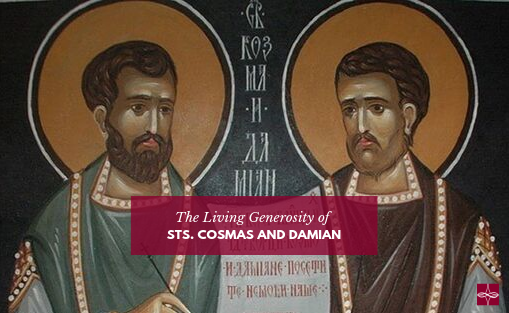

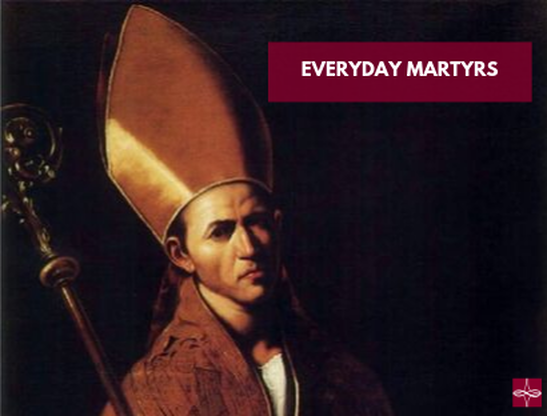

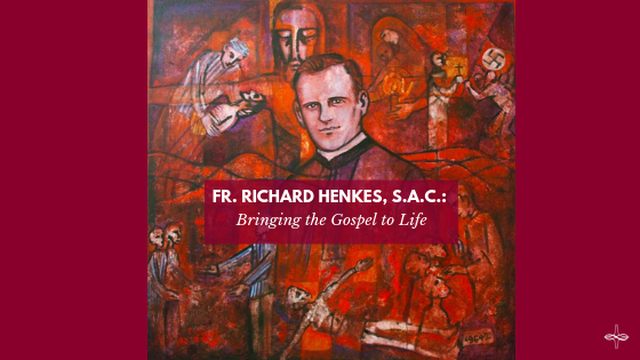
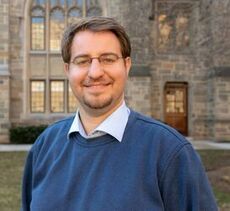
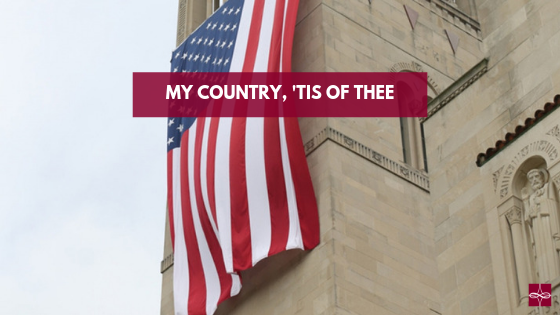

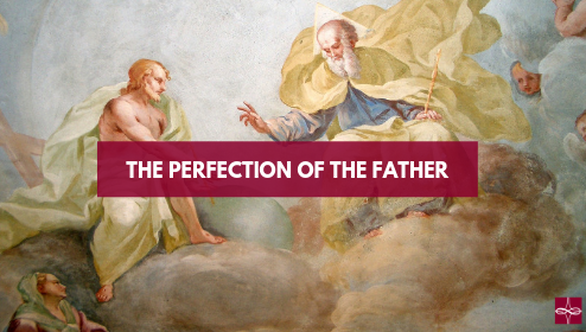

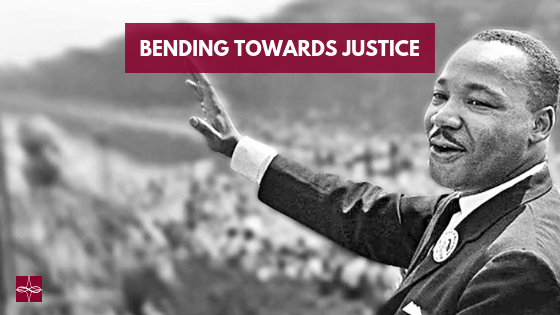


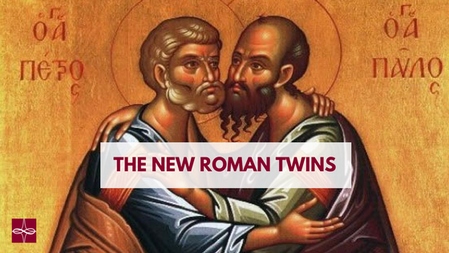

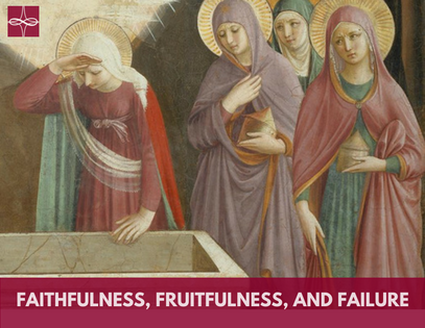


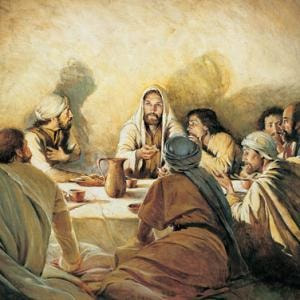
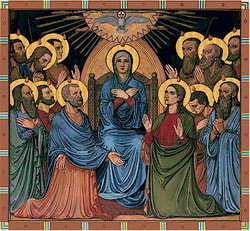



 RSS Feed
RSS Feed